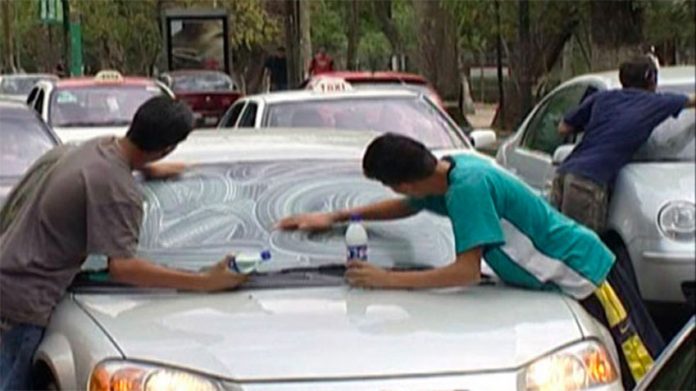The horns blared all around the driver, the Frenchman, to my left. The light had been green for four seconds, but a kid armed with a bottle of detergent and a flat rubber wiper was still in the middle of soaping up the glass.
“Merde,” he cursed in a Gallic accent, and began to tease the gas pedal. The young snipe didn’t flinch. Taking up a suspended position on the hood of the car, his legs dangling over the now rolling wheel, he methodically wiped away the remaining soap with five flicks before the other passengers, myself and the cameraman, could protest.
“Stop! Are you trying to kill him?” we shouted bilingually. The brakes came on, and the young man jumped off. He glared at the Frenchman but from the passenger side my hand was already brandishing a 20-peso note aloft.
Twenty pesos for the service was a first, probably for everyone involved, but the event had been just as unique.
Having been conveyed at least five meters back to his starting position beneath the traffic lights on the hood of our car, the young man changed his looked of bemusement for one of pleasant surprise at the sight of the blue plastic note, and skipped between us and the honking cars made to wait.
He plucked the note from the hand and as we looked up, sighed collectively at his forgiveness and exchanged a muted laugh, the car behind us blared his horn again. He needn’t have bothered; the light had gone back to red.
After six years in Mexico, it’s easy to become accustomed to the nuance of context and situations. The Frenchman, despite having married a Mexican and living here for three years, doesn’t drive, and has therefore missed out on an entire sub-section of driving culture in this country – the limpiaparabrisas.
The remonstrations weren’t harsh; the kid hadn’t seemed angry, and even if he had wanted to identify us it would have been impossible. The Frenchman had parked on a yellow-painted curb the day before in Querétaro and our license plate had been removed.
I sympathized with him. Driving in Mexico is no easy business, and when it comes to the ins-and-outs, the do’s-and-don’ts of the autopista, stoplights can be perplexing, and the only way to have an idea is through experience.
Should you find yourself facing the rapid advance of a soap-toting chap at a stoplight and you don’t want the service, the universal Mexican gesture is the wagging finger – to and fro – above the steering wheel. That’s to be respected, and you’ll find the majority simply pass you by.
If however, the individual offering the service has caught you off-guard, then the cultural rule here is – tough luck. He’s going to finish the job and expect payment in kind. Their logic is, you’re driving a car, so of course you’re aware of everything in front of you; if you haven’t given the wagging finger it’s because you want your glass washed. Maybe it will make the things going on in front of you more visible. And you can see their point.
I tend to make the most of the consequences of a dozy moment and ask them to do the rear windscreen while they’re at it.
What you certainly shouldn’t do, unless you’re after a squirt of detergent through the gap in your window, is activate your own mechanical wipers, curse at them, or take them on a car-hood hayride back to their starting point.
They’re just trying to make a living, and Mexico can be a hard place for the guys on the other side of the glass.
Alasdair Baverstock is a freelance foreign correspondent and reporter for CGTN who has covered Mexico and Latin America for nearly a decade. You can follow him across social media at @alibaverstock.
